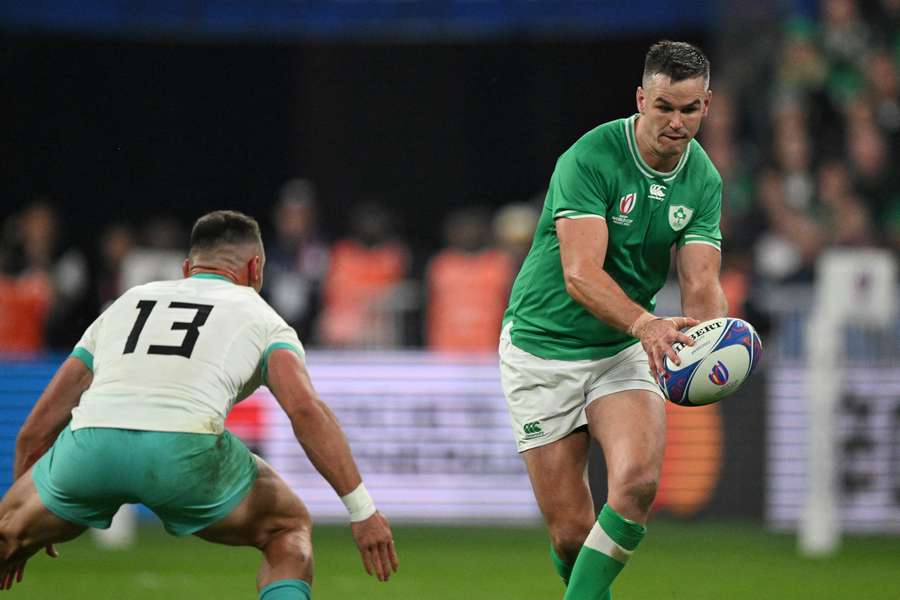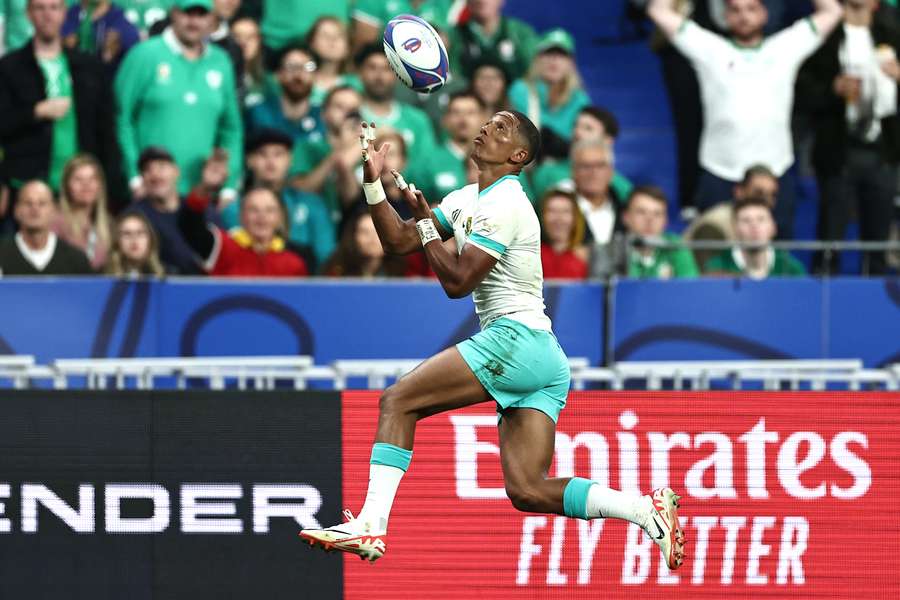The most anticipated game of the pool stage pitted the IRB’s highest-ranked teams against one another in a fascinating clash of styles.
The ferocious South African defence that had conceded just three points in their opening two matches versus the speed and dynamism of the Irish attack.
Big games have a tendency of failing to live up to their own hype, but this one delivered and then some, with the result on a knife-edge right until the final play.
It bore all the hallmarks of a World Cup final given the intensity and brutality on display, and might still prove to be the most spectacular of warm-up acts if both nations are able to navigate their way through the tournament to the showpiece on October 28.
Ireland overcome jittery start
Backed by the vociferous green-clad supporters in attendance, Ireland signalled their intent early on, turning down a simple three points in front of the posts - instead opting for a kick to the corner.
Despite that positive approach, there were signs of nerves among the Irish ranks, as Rónan Kelleher missed the target with three attacking line-outs inside the opening 10 minutes, allowing the Springboks to edge ahead on the scoreboard.
An error-strewn start in such a pivotal clash might have seen previous Irish sides retreat into their shell, but Andy Farrell’s men held their nerve and rose to the occasion.
After withstanding a barrage of South African pressure - thanks in large part to some brilliant defensive work from influential winger James Lowe - Ireland pierced through the opposition defence to score what turned out to be a match-winning try.
The in-form Bundee Aki broke from his own half into the South Africa 22, and after Ireland retained possession from a five-metre line-out, a vintage loop and dummy from Johnny Sexton created the space for Mack Hansen to dot down in the corner.

It was a clinical piece of rugby from Ireland and a mark of how deadly they can be against the sternest of defences.
Having now lost just two of their last 30 Test matches since early 2021, one of Ireland’s greatest strengths remains their mental resilience.
That was on full display once again in Saint-Denis as Ireland recovered from an uncharacteristically sloppy start to slowly take control against the defending champions, edging a ferocious battle at the breakdown, before defusing South Africa’s “Bomb Squad” of seven replacement forwards in the second half.
The Irish pack put in a heroic defensive display with the likes of Tadhg Furlong, Josh van der Flier and Caelan Doris all immense when it came to repelling the relentless South African attack.
That strong base enabled Farrell’s side to play with greater speed and freedom in possession - something which is essential against a blitz defence as effective as the Boks’.
Springboks’ selection risks backfire
The continued selection of Manie Libbok as the Springboks’ first-choice goal-kicker has drawn plenty of criticism over the past few months, with many supporters fearing the fly-half’s low success rate from the tee would inevitably come back to haunt South Africa in the big matches.
Unfortunately for Libbok that proved to be the case on Saturday evening.
While Sexton left the field to a hero’s reception in the 72nd minute, the Springboks’ fly-half was left to rue another wayward performance in front of the posts.
And while it seems harsh to focus purely on his goal-kicking when he offers so much more to the team in terms of his distribution and speed of thought in attack, those misses - as well as the two long-range penalties by Faf de Klerk - ended up costing South Africa 11 points.

Sexton leapt to Libbok’s defence after the match backing the “quality” fly-half to come good after a challenging period all goal-kickers invariably face at some point in their careers.
Unfortunately for Libbok, the Springboks simply don’t have the time to wait for that to happen in this tournament.
Given the absurdly small margins that separate the best sides in the world, Jacques Nienaber will surely turn to fit-again Handré Pollard if South Africa complete the job against Tonga this weekend and make it through to the knockouts.
While South Africa’s goal-kicking has taken the brunt of the blame for Saturday’s defeat, another decision that backfired for the Springboks was their hotly debated 7-1 split of forwards to backs on the bench.
It was a tactic implemented in their demolition of New Zealand prior to the tournament, but other than an unconverted Cheslin Kolbe try, South Africa had nothing to show for their numerous entries into the Irish 22.
That selection also raised question marks over the wisdom of not picking an out-and-out replacement hooker on the bench.
At a pivotal late juncture, hybrid stand-in Deon Fourie was punished for a crooked throw, while the Boks sorely missed the ball-carrying threat of the injured Malcolm Marx.
Given Pollard’s impending return, it seems likely that Rassie Erasmus and Nienaber will drop their overblown 7-1 split for the rest of the tournament, opting for something more balanced instead.
Irish rugby targets history
Ireland may have opened their World Cup campaign in a relatively low-key manner with comfortable wins over Romania and Tonga, but the nature of their victory over the 2019 champions has firmly underlined their status as the world’s number one side.
A positive result against Scotland in their final pool match will see Ireland top the group, setting up a likely quarter-final clash with New Zealand - a team Ireland beat twice in a row last summer.
Farrell’s side would go into that match as favourites, although the All Blacks would point to Ireland’s record of never having progressed beyond the last eight at a World Cup as somewhat of a leveller.
It remains to be seen how Ireland build on Saturday’s statement performance as they chase history, but after 16 consecutive Test wins, Farrell’s green army are very much the team to beat in the latter stages of the tournament.


